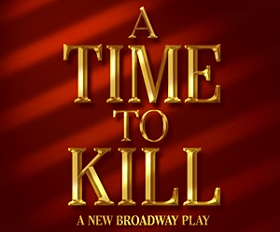VERDICT: WEAK ADAPTATION
There’s something innately suspenseful about a courtroom drama. Perhaps it’s the fact that real life courtrooms are themselves theaters and a criminal trial is essentially one long play – either a tragedy or a melodrama, depending on the result. The prosecutor puffs, the defense attorney huffs, and the defendant squirms 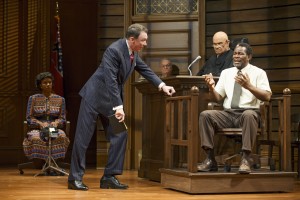 and tries to look like the guy next door, not the hideous murderer of eight nuns he might truly be.
and tries to look like the guy next door, not the hideous murderer of eight nuns he might truly be.
Once, I was at a café and I happened to be seated next to a table containing a Murmur of Judges (for such is the collective term). Apparently they all went out to lunch once a month to bond with each other and laugh about the crooks they sent to the pokey. One of the more amiable judges swanned over to us with an avuncular secret: “Do you know the most important thing to remember when you’re a judge?” he asked. “You have to look like you have hemorrhoids.” So, you see, even a real judge recognizes that there’s acting involved with the judicial process.
Rupert Holmes’ adaptation of John Grisham’s novel A Time to Kill has one thing going for it: The atmosphere feels quite authentic. The play, which opened tonight at the John Golden Theatre, is mostly set in a courtroom in real time. Indeed, the atmosphere in director Ethan McSweeny’s crisp, polished production is almost consistently electric. James Noone’s wood-paneled courtroom set is disturbingly genuine, and the motions and objections fly about with the authenticity of a real 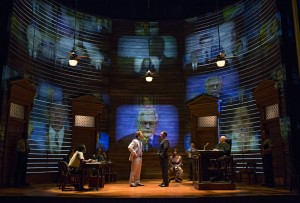 trial (although most real-life courtrooms aren’t on a gigantic circular revolve that spins around and around like the teapot atop a Lazy Susan in a Chinese restaurant).
trial (although most real-life courtrooms aren’t on a gigantic circular revolve that spins around and around like the teapot atop a Lazy Susan in a Chinese restaurant).
Holmes’ play opens with a series of vivid visual images played against the courtroom back wall (projection design by Jeff Sugg). A young black girl has been raped in rural Mississippi, and two white redneck thugs (Lee Sellars and Dashiell Eaves) are quickly arrested for the crime. One of the goons even confesses. It looks like a surefire conviction until Carl (John Douglas Thompson), the grieving father of the raped girl, storms into the courthouse and shoots both rapists with an automatic weapon. Carl can’t deny what he’s done – he considers it justice – and his faith and anger convince young firebrand attorney Jake Brigance (Sebastian Arcelus) to take his case.
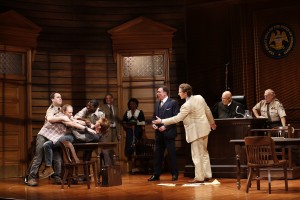 Jake, a recurring hero in Grisham’s novels (and who appears in his latest, just released work, Sycamore Row), here has his work cut out for him, trying to whip up an insanity defense that will make sense to the racially troubled community around him. Jake is matched by oily district attorney Rufus (Patrick Page), and becomes a target of the local KKK’s rage – but he is assisted by his equally ruthless friend Lucien (Tom Skeritt), a disbarred attorney capable of doing anything sleazy if it will win the case. Assistance also arrives via Ellen, an attractive law student (Ashley Williams, who has the thankless role of being the play’s only active female character; Tonya Pinkins plays the defendant’s wife, but her part is quite marginal).
Jake, a recurring hero in Grisham’s novels (and who appears in his latest, just released work, Sycamore Row), here has his work cut out for him, trying to whip up an insanity defense that will make sense to the racially troubled community around him. Jake is matched by oily district attorney Rufus (Patrick Page), and becomes a target of the local KKK’s rage – but he is assisted by his equally ruthless friend Lucien (Tom Skeritt), a disbarred attorney capable of doing anything sleazy if it will win the case. Assistance also arrives via Ellen, an attractive law student (Ashley Williams, who has the thankless role of being the play’s only active female character; Tonya Pinkins plays the defendant’s wife, but her part is quite marginal).
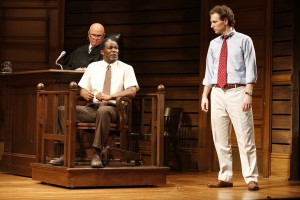 TV’s Law and Order casts a long awkward shadow over the production – indeed, the Judge is played by former Law and Order alum Fred Dalton Thompson in full grumpus mode, blustering away like the winds of Hurricane Katrina. Yet here’s the problem with the play: While the execution of McSweeny’s staging is taut and involving, the text itself is simultaneously dryly dense and narratively flimsy almost to the point of being irritating. The play, it seems, awkwardly concertizes the novel’s plot, without capturing the nuance and the subtlety for which Grisham is famous.
TV’s Law and Order casts a long awkward shadow over the production – indeed, the Judge is played by former Law and Order alum Fred Dalton Thompson in full grumpus mode, blustering away like the winds of Hurricane Katrina. Yet here’s the problem with the play: While the execution of McSweeny’s staging is taut and involving, the text itself is simultaneously dryly dense and narratively flimsy almost to the point of being irritating. The play, it seems, awkwardly concertizes the novel’s plot, without capturing the nuance and the subtlety for which Grisham is famous.
It makes one realize how weak the Grisham novel is. The case that Jake is forced to bring to trial is noticeably weak and unconvincing – and the writing’s lack of emotional affect sabotages the attempts to build enough sympathy for the outcome 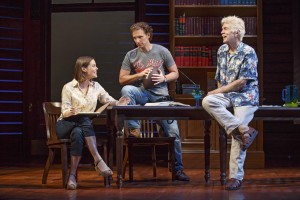 we’re supposed to be rooting for. In fact, based on what we see on stage, Carl’s reasons for killing the brutes are not balanced by justice – and Jake’s attempts to defend him ultimately come across as the sleazy maneuverings of a cut rate shyster, not the likable efforts of an idealistic hero. It is possible that the book’s artful writing manages to buffer the central premise’s displeasing aspects, but the drama demands that we have sympathy for a situation that the stage activities haven’t earned. To make matters worse, the entire hook of the plot depends on a totally extraneous subplot involving an expert witness that proves or disproves nothing about the main plot.
we’re supposed to be rooting for. In fact, based on what we see on stage, Carl’s reasons for killing the brutes are not balanced by justice – and Jake’s attempts to defend him ultimately come across as the sleazy maneuverings of a cut rate shyster, not the likable efforts of an idealistic hero. It is possible that the book’s artful writing manages to buffer the central premise’s displeasing aspects, but the drama demands that we have sympathy for a situation that the stage activities haven’t earned. To make matters worse, the entire hook of the plot depends on a totally extraneous subplot involving an expert witness that proves or disproves nothing about the main plot.
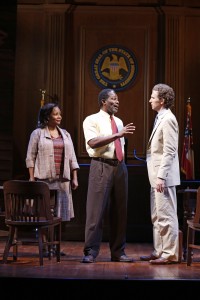 The acting work is assured and polished, but inevitably seems a little too camera ready: We often feel as though we’re watching understudies for the movie actors originally playing their parts in the 1990s opus that came before. As Jake, Arcelus is a dead ringer for Matthew McConaughey in both performance and hairstyle – it’s really a little distracting: We almost expect him to doff his clothes and start playing the bongos, but thankfully he never does. In the role of the accused murderer, John Douglas Thompson brings layers of angst and rage to his character, though his actions remain strangely indefensible. In the role of Lucien, Skeritt is suitably wily playing a character whose moral compass spins like a dreidel. He’s supposed to be likable, but it’s not clear how that definition is supported by his actions. For a major star, the part is peculiarly thankless, adding nothing to the plot or central relationships.
The acting work is assured and polished, but inevitably seems a little too camera ready: We often feel as though we’re watching understudies for the movie actors originally playing their parts in the 1990s opus that came before. As Jake, Arcelus is a dead ringer for Matthew McConaughey in both performance and hairstyle – it’s really a little distracting: We almost expect him to doff his clothes and start playing the bongos, but thankfully he never does. In the role of the accused murderer, John Douglas Thompson brings layers of angst and rage to his character, though his actions remain strangely indefensible. In the role of Lucien, Skeritt is suitably wily playing a character whose moral compass spins like a dreidel. He’s supposed to be likable, but it’s not clear how that definition is supported by his actions. For a major star, the part is peculiarly thankless, adding nothing to the plot or central relationships.
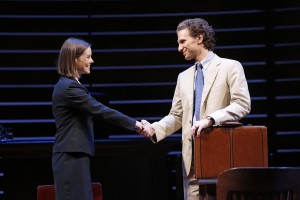 The show does possess a huge central figure whose star turn encompasses all the other roles put together. No, I am not talking about Fred Dalton Thompson, whose matter of fact harrumphing is indeed perfect for his role as the deliciously named Judge Noose. I am talking about the turntable which whisks the courtroom about so the lawyers are, at one point, facing us as they address the jury, and then rotates again so that the judge is talking to us. It’s quite a nice theatrical device. Otherwise, for all its size, this book adaptation has less impact than either its original source or the motion picture, which eclipses them both.
The show does possess a huge central figure whose star turn encompasses all the other roles put together. No, I am not talking about Fred Dalton Thompson, whose matter of fact harrumphing is indeed perfect for his role as the deliciously named Judge Noose. I am talking about the turntable which whisks the courtroom about so the lawyers are, at one point, facing us as they address the jury, and then rotates again so that the judge is talking to us. It’s quite a nice theatrical device. Otherwise, for all its size, this book adaptation has less impact than either its original source or the motion picture, which eclipses them both.
photos by Carol Rosegg
A Time to Kill
presented by Daryl Roth and Eva Price
John Golden Theatre
scheduled to end on November 17, 2013
for tickets, visit http://atimetokillonbroadway.com
